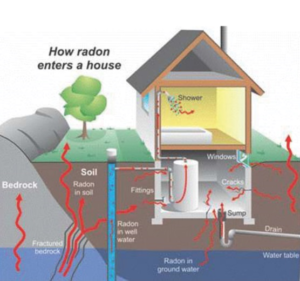Radon Remediation 101: At What Level Should Radon Be Mitigated?
 Radon is present in many homes across the country and the state of Pennsylvania is no exception. In fact, homes in Pennsylvania counties with higher than acceptable levels of radon are fairly common, as is radon remediation (mitigation). Radon gas can be present in an existing home or in a brand new home. The invisible and odorless gas emanates from the radon-containing soil under a home. The gas travels upward through the soil and gains entrance into a building.
Radon is present in many homes across the country and the state of Pennsylvania is no exception. In fact, homes in Pennsylvania counties with higher than acceptable levels of radon are fairly common, as is radon remediation (mitigation). Radon gas can be present in an existing home or in a brand new home. The invisible and odorless gas emanates from the radon-containing soil under a home. The gas travels upward through the soil and gains entrance into a building.
The EPA advises that radon should be mitigated at levels of 4pCi/L or more. However, as radon gas has been labeled the second highest cause for lung cancer, after smoking, homeowners may choose to mitigate at lower levels to ensure the safety of their families.
What Do I Do if My Home Has High Levels of Radon?
If your home has been tested and your levels of radon are high, you should look into options for mitigation. A qualified company can evaluate your home and design a system that will effectively reduce the radon levels in your home. Different types of home require different types of systems and the differences will impact the cost of radon remediation.
For homes built on a slab foundation, the most common type of radon remediation technique is sub-slab depressurization. This method involves inserting a pipe into the area below the foundation and using a fan to pull the tainted air from the space. This system can be configured in an attic or outside of the home.
For homes with a crawl space or basement with an earthen floor, sub-membrane ventilation is often used. A plastic barrier is used to act as a collection cover for the gas-laden air.
Homes with basements can also benefit from a block wall suction system. This system utilizes ductwork and a fan to create suction on the cavities of a concrete block wall. The air pressure inside the wall is kept lower than the air pressure in the basement and the polluted air is pulled out before being able to enter the basement interior.
Radon-Rid, LLC Determines the Most Effective Radon Remediation System for Your Home
Radon gas is hazardous to the health of residents, and if the gas level is high enough, homeowners should seek remediation for the safety and well-being of those living within. For information about radon gas levels and radon remediation, contact us today.
PA HIC Cert. # PA047660C
Mitigation Cert #2586
Testing Cert #2585
Related Posts
Why Are More People Testing for Radon in 2020?
Why Should I Hire a Professional Radon Testing and Remediation Company?
Is Radon Testing Necessary When Buying A Home?
We Want to Help
"(required)" indicates required fields
Categories
- Blog (48)
- Environmental Pollution (2)
- Family Health (9)
- In the News (10)
- Lung Cancer (5)
- Radon Remediation (10)
- Radon Testing (24)
Radon – The Silent Killer
Radon In Your Home
- Learn More About Radon Levels in Your County
- Take a few minutes to browse our Get To Know Radon Online Presentation.
- When you are finished, be sure to tell a loved one about our testing programs offered in Berks, Chester, Delaware, Lancaster, Montgomery & Philadelphia Counties.